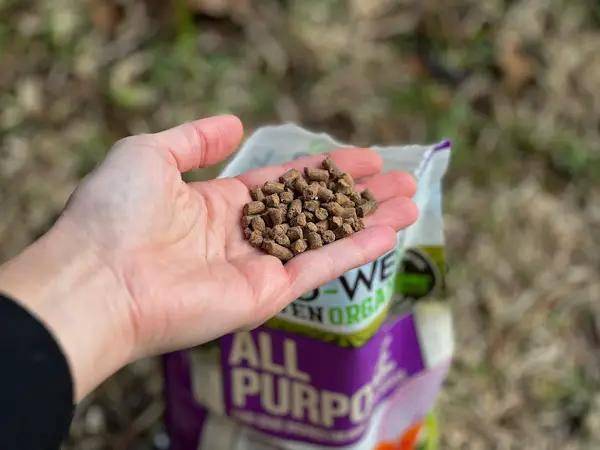
We may receive commissions from purchases made through links in this post, at no additional cost to you.
When it comes to fertilizing your garden, there seems to be an endless choice of plant foods at the garden center. Even the fertilizer shelf in my garage can be overwhelming at times. But for blackberries, fertilizing is an essential part of growing the biggest, sweetest, and most abundant berries possible. And who doesn’t want that?
The next time I’m at the garden center, I want to be confident that I’m choosing the right fertilizer for my situation. So how do you decide what fertilizer to use? What are the best fertilizers for blackberry plants?
The best blackberry fertilizers provide plenty of nitrogen and a balance of other nutrients (such as 10-10-10 or 5-2-2). Before fertilizing, test the soil’s pH level and nutrient composition to determine what the plant may be lacking. Ideally, use organic fertilizers to also enhance soil health.
Next to pruning, fertilizing is probably the most important thing you can do for your blackberry plants. The right fertilizer will not only help your blackberries grow more vigorously, but the quality of the fruit will improve. Every plant has its own set of needs – sun, water, soil, nutrients. In this article, we’ll take a look at what fertilizers are best for blackberries, and when and how to apply them.
Do Blackberry Plants Need Fertilizer?
The first question to ask is, do I even need to fertilize my blackberry bushes? Answer: probably, but it depends. All fruit-producing plants require adequate nutrition to grow the best fruit. But blackberries are not as nutrient-demanding as many other fruits.
How and when to fertilize blackberries (and what to use) largely depends on the quality of the soil. If your berry bushes are planted in rich, loamy, well-draining, acidic soil with plenty of organic material, then the roots may already have access to everything they need.
Learn more: 6 Ways to Grow Bigger, Juicier Blackberries
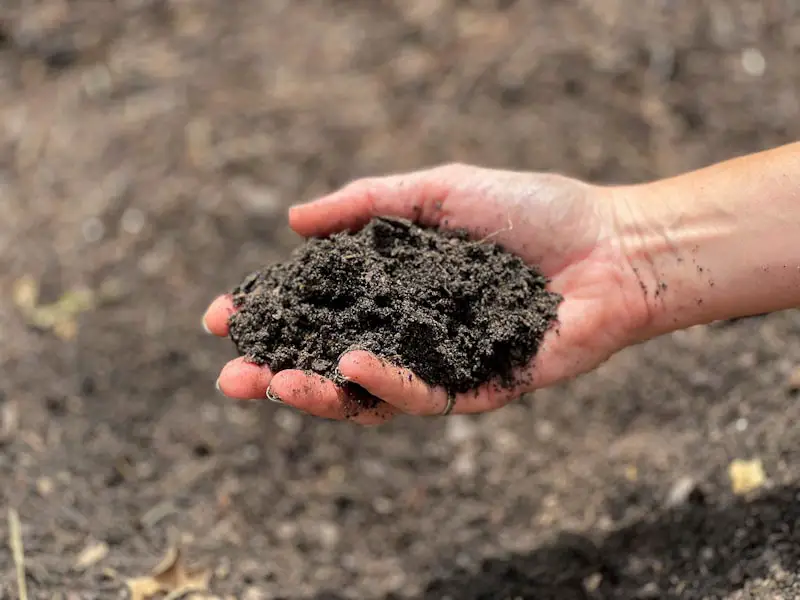
If your plants are growing well, and you’re happy with the quality of the fruit, then stop right there. No need to fertilize additionally. Established blackberry bushes, in particular, are likely to need less fertilizing than younger, newly-planted ones.
However, if you hope for bigger, sweeter, more abundant berries, or if you notice the leaves are pale or growth is slow, then it’s time to intervene. But before you pick up a bag of fertilizer, the first thing to do is test your soil.
Learn more: Why are my Blackberries Sour? Tips to Grow Sweeter Berries
Testing the Soil
To find out if your soil has the proper pH, and enough nitrogen, phosphorus, and potassium to support the blackberry plants, use a simple soil test kit like this one. These kits are easy to use and can give you a good idea of what your soil may be lacking.
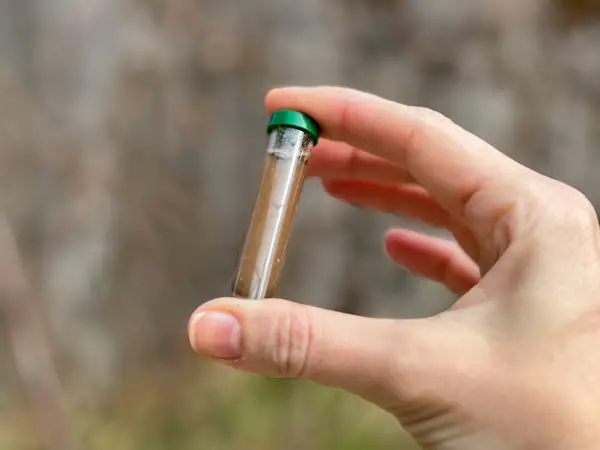
Follow the package instructions for best results. Most kits will have you dig some soil a few inches below the surface, mix it with distilled water in a certain proportion, and then add a testing agent or powder. Then you compare the color of the resulting solution with a chart to estimate the amount of that nutrient (or pH level) in the soil.
Use the results to figure out whether or not your blackberry bushes need additional fertilizer, particularly if you notice low nitrogen levels. It’s a good idea to test the soil at different times throughout the growing season to assess the plant’s needs.
Soil Testing Labs
Testing the pH and macronutrient content with an at-home soil test kit is a good tool to use, but it only provides limited and semi-accurate information. To get a more complete picture of your soil composition, you can send a sample to a soil testing lab. Visit this site for a list of soil test labs by state. You can also contact your local cooperative extension office to find out where to test your soil locally.
When to Fertilize Blackberries
As a rule, fertilize blackberry bushes in early spring as buds are forming, and in late summer after the fruit harvest. Some blackberry plants, especially those in very sandy, lean soil, may need additional fertilizer in midsummer. In fall, mulch around the plant with compost or well-rotted manure.
Spring
The first feeding in spring will give the plant a growth boost as it’s waking up after dormancy. Blackberries form on 2-year old canes, called floricanes. These are the canes that didn’t produce any fruit the previous summer, but now will branch out and become laden with berries. Fertilizing in spring, right at the beginning of growth, will enhance both cane growth and berry size.
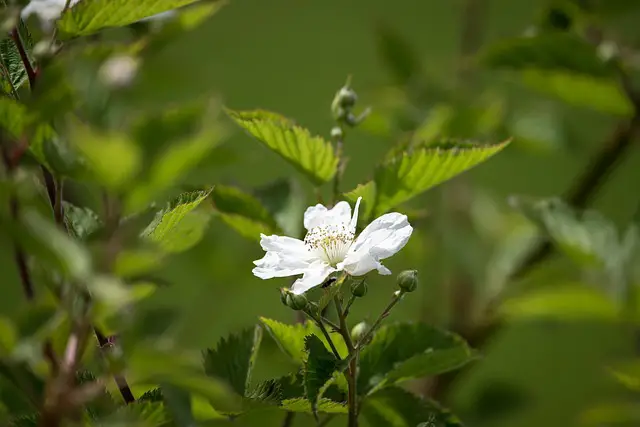
Late Summer
After the fruit has been picked, usually in July (depending on climate and variety), feed the plants again. This time, the extra food will help the new canes (primocanes) grow in anticipation of fruiting the following year.
Additional Fertilizing
Finally, as the blackberry bush is getting ready to go dormant over the winter, add a layer of well-composted manure or other organic compost around the base of the plant. Manure and compost will add a gentle dose of nitrogen and other nutrients that will be broken down into the soil over the winter. Anything you can do to feed the soil now will benefit the blackberry bush next year.
Blackberry plants grow well in fairly sandy soils, as long as there’s enough organic material to support the plant and retain some moisture. If your area has particularly sandy or lean soil, your blackberry bushes may benefit from extra fertilization in the middle of the growing season.
If the plant seems pale, or if growth is slow and the berries are too small, then fertilize again in midsummer (June, most likely). Observation is key – how is the plant looking and behaving? Test the soil again to check for nutrient content.
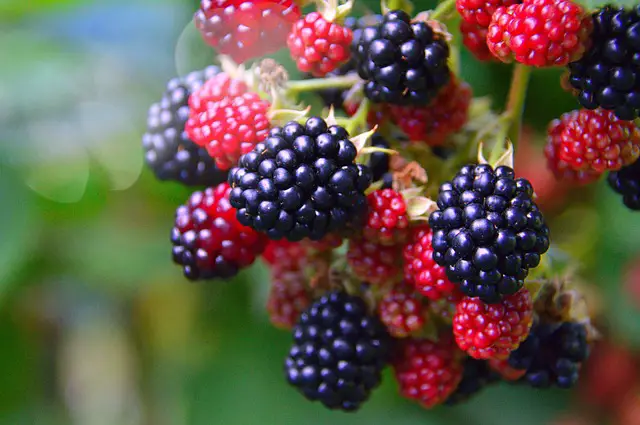
However, be careful not to over-fertilize! It’s better to err on the side of caution. Try fertilizing once or twice per year, then assess how things went. If your blackberry plant was slow to grow, or if the fruit was small and sour, then add a third feeding next season.
Choosing the Right Fertilizer for Blackberries
What does the plant need?
Blackberries like to grow in acidic soil with a pH between 5.5 and 6.5 (although they may tolerate all the way to a pH of 4.5). The proper pH range is essential, as that is what allows the roots to absorb the right nutrients.
The most important nutrient blackberries need is nitrogen. Nitrogen promotes the growth of roots and shoots, including the long canes that will eventually produce blackberries in their second year. Some fruit trees and shrubs need to avoid excessive nitrogen, otherwise they will be all leaves and no fruit. But blackberries respond well to nitrogen-rich fertilizers because they often need more nitrogen than the soil provides.
Be careful, however, when fertilizing younger plants. It’s better to choose a more balanced N-P-K fertilizer in the first two years of growth (such as 4-4-4). Too much nitrogen in young blackberry plants can reduce fruit quality and make the plants more prone to disease. Excessive nitrogen can also cause deficiencies of other nutrients, such as calcium, potassium, and magnesium.
Composted manure is a good source of nitrogen and other nutrients. If available, use chicken or rabbit manure for the highest nitrogen concentration.
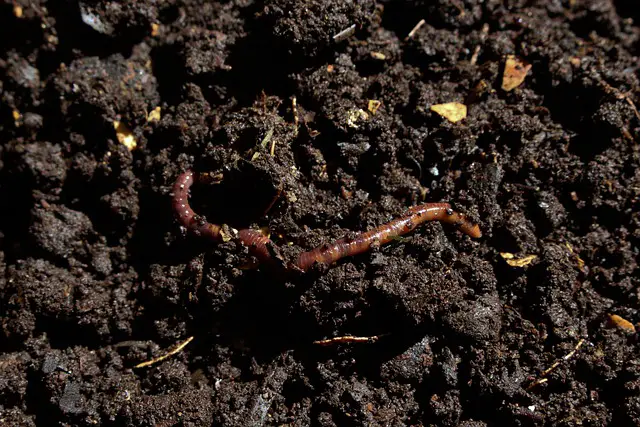
When possible, use organic fertilizers to feed home-grown blackberry plants and other edible crops. Organic fertilizers are naturally derived, less prone to burning, and provide more micronutrients to feed the soil. They typically have lower concentrations of nitrogen, phosphorus, and potassium than synthetic fertilizers, which makes them and gentler on plants and more forgiving to use.
It’s not recommended to use liquid fertilizers for feeding for in-ground blackberry bushes. Liquid fertilizers tend to leach through the soil too quickly to be absorbed by the roots completely. They may provide a quick dose of nutrients, but a slow-release, granular fertilizer will feed the plant better over time.
On the other hand, soluble fertilizers are very beneficial for potted blackberry plants. There is less microbial activity in a potted plant, meaning fewer organisms that can break down a granular slow-release fertilizer and make the nutrients available to the roots. Liquid fertilizer delivers food directly to the plant, without having to be broken down first.
Recommended Fertilizers
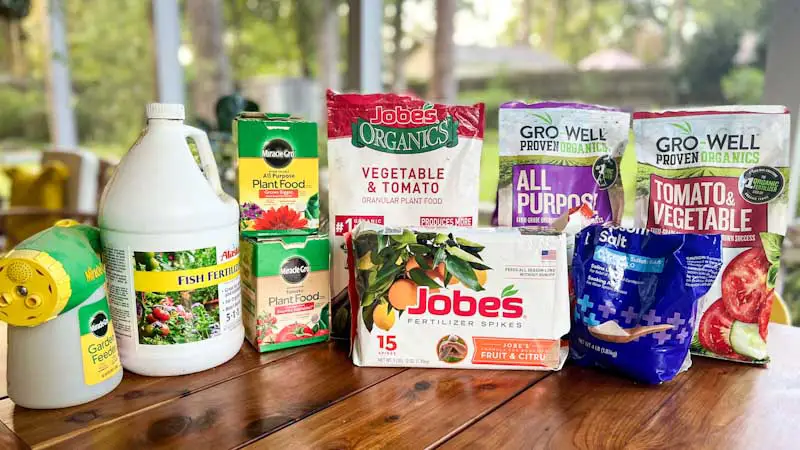
There are many fertilizers out there that will work well for blackberries. I recommend the ones below because of a combination of nutrient content, natural ingredients, price, and availability. Any fertilizer that is formulated specifically for blackberries (or berries in general) would also be a good choice.
Dr. Earth Natural Wonder Organic Fruit Tree Fertilizer (5-5-2)
This is a great choice for new blackberry plants because it contains mycorrhizae, beneficial fungi that enhance nutrient absorption and help prevent transplant shock. It’s a little more expensive, but the ingredients are the highest quality possible. And it’s pet safe, too.
Jobe’s Organics Fruit and Citrus Granular Plant Food (3-5-5)
This fertilizer will help fruiting and overall growth in established and new blackberry plants. It uses a special ingredient called Biozome, a microorganism that rapidly breaks down material so it can be absorbed quicker. It’s a great all-around fruit fertilizer.
Espoma Organic Berry-Tone Fruit and Berry Food (4-3-4)
Use this fertilizer on established blackberry plants. It provides a good balance of NPK, with additional sulfur, calcium, and magnesium derived from natural ingredients. The 5% sulfur may help to lower the soil’s pH over time, which will help nutrient absorption.
True Organic Berry Food (5-4-4)
This one is similar to the Espoma Berry-Tone, in that it provides balanced and well-rounded nutrition, although it contains a higher percentage of calcium (6%) and a lower percentage of sulfur (1%).

